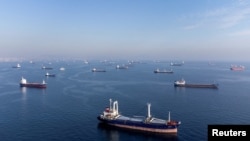Meeting with the Russian Security Council on November 2, Vladimir Putin said Russia would resume taking part in an agreement to protect ships carrying grain from Ukraine’s Black Sea ports.
That was a reversal from days earlier, when Russia claimed Ukraine had undermined the so-called Black Sea Grain Initiative after attackers hit Russian military ships in Crimea.
“Ukraine used this [grain] humanitarian corridor to attempt to attack the Russian Black Sea Fleet. In this connection, we decided to suspend our participation in the grain convoys.”
He said Russia only resumed participation because Ukraine said it would never happen again:
“Our Defense Ministry received information from the Turkish side that Ukraine had provided these assurances and that these humanitarian corridors would not be used for military purposes.”
Problem is, Russia's claim that Ukraine exploited the humanitarian corridor for an attack is unsubstantiated. And recall that a day after the grain accord was reached on July 22, it was Russia that unleashed a missile strike on the port of Odesa.
The background:
Ukraine is one of the world’s great breadbaskets, producing wheat, corn and other grains that feed Europe, the Mideast and parts Asia and Africa.
After months of Russia’s war had disrupted Ukrainian agricultural production, grain had piled up in Black Sea ports. Shipping it amid the fighting was simply too risky.
Enter the grain deal, brokered with help from Turkey. The agreement stipulates that the parties "will not undertake any attacks against merchant vessels … and port facilities engaged in this initiative."
Mostly it has worked. Through the end of October, nearly 9 million metric tons of grain had made it out of three Ukrainian ports to a hungry world.
On October 29, however, an attack by drones struck Russia’s Black Sea fleet in Sevastopol. Russia quickly blamed Ukraine, which neither confirmed nor denied responsibility, and claimed without evidence that British navy specialists were involved, the BBC reported. An unconfirmed video, purportedly showing a cruising drone being fired on at sea, circulated on social media.
The New York Times reported:
"British officials have denied involvement, while Ukrainian, American and other Western officials have mostly refused to comment about the video or the attack. But the attack comes a few months after the United States, among other NATO allies, said it was supplying Ukraine with remote-controlled boats, even while, unusually, refusing to give details about that military aid."
According to the Institute for the Study of War (ISW), a Washington, D.C., think-tank that is closely monitoring the fighting, Ukraine’s armed forces likely attacked the Russian ships.
The ISW noted that Russia’s Black Sea Fleet includes three frigates armed with Kalibr missiles, and that Russia has used such missiles and drones to shell Ukraine’s energy infrastructure for three weeks now.
But the ISW pointedly noted: “Attacks on military vessels in wartime are legitimate acts of war and not terrorist attacks.”
Nonetheless, on the evening of the attack, Russia said it would “suspend” participation in the grain deal. It accused Ukraine of using the humanitarian corridor to conduct the strike.
The Interfax news agency, citing Russia’s Defense Ministry, said: “[T]he maritime drones moved along the security zone of the ‘grain corridor’, after which they changed route in the direction of the Russian ships base in Sevastopol.”
Russia also claimed one of the drones was launched from a ship carrying Ukrainian grain along the humanitarian corridor.
United Nations aid chief Martin Griffiths rejected Russia’s accusations that a civilian cargo ship may have been involved in the drone attack, saying that “none were in the corridor on the night of 29 October when the reported attacks took place.”
Griffiths explained that when there is no civilian cargo ship with grain moving along the humanitarian corridor, the corridor does not exist.
“[T]he corridor is just lines on a chart: When initiative vessels are not in the area, the corridor has no special status,” he told the U.N. Security Council on October 31. “It provides neither cover nor protection for offensive or defensive military action.”
The grain deal continued even after Russia withdrew from it. On October 31, according to U.N., “12 ships sailed out from Ukrainian ports, and two headed in to load food.”
What about Putin’s claim of receiving “guarantees” from Ukraine?
According to Ukrainian Foreign Ministry spokesman Oleg Nikolenko, Ukraine has made no additional promises and will continue to comply with the grain deal.





